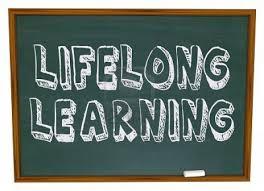Lifelong Learning
Apr 28,2015
Why it's suggested
"Education seems to be an elixir that can bring us a healthy body and mind throughout adulthood and even longer life." says Margie E. Lachman, a psychologist at Brandeis University who specializes in aging. This is one of the key reasons why Lifelong Learning can be an important ingredient in living a happy life. The article referenced below along with my own opinions on education is what gave me the inspiration to write this article. I will go through some ways continuing learning throughout your life can benefit you in the long run.1
Different Levels
Like most thing in life, there are different routes you can take to get to your goal of lifelong learning. These different options can produce different amounts of success as well. There is maintenance learning, growth learning, and shock learning. Maintenance Learning refers to keeping current in your field. The types of things you need to do for maintenance learning can usually be discovered by speaking with successful people in your industry. Then there is Growth Learning, which usually includes looking into books, articles, videos, and courses that will help you add considerable amounts of knowledge in your field. The last type is Shock Learning, which is what happens when you accept a major change to your daily routine and learn more about it in order to put it into practice.2
Computer Assistance
There are many ways to use computers to help increase your vocabulary, your focus, your memory, and your math skills. A couple that very popular among smartphone users are Lumosity and Elevate. However, there are plenty of other apps that can help with each of these skills. You can also involve a friend using some kind of social networking if you want to add that aspect to your learning experience.1
Traditional Assistance
There are plenty of old school ways to test your brain as well. Many papers include a crossword puzzle or some other simple game in them to test your understanding. Some other traditional games are sudoku, mazes, jigsaw puzzles, and chess. It can also be a challenging test if you find a book at the local library which you believe will be above your reading level. Some books include other traditional brain teasers as well. Another challenging activity that may or may not include computers (depending on the type) is to enroll in a class or training program.1
Finding New Hobbies
Hobbies are other things to learn than games and classes that you can do on your own or in groups as well. Some different types of Hobbies include collecting things like Buttons, Coins or Antiques. Other activities are Sewing, Art, Music, Cooking, and other home crafts. You also include outdoor activities when the weather is right. Or you can join in some of the local events happening in your community.3
Lynda.com
This is an extremely valuable resource online that is provided for free. Their motivation is to make every subject that they can experts to write about available to everyone. These might be subjects that will help you advance in your field or they can simply be subjects to take your mind off of work or school. This may seem overwhelming at first, but to give you an idea of how much this can help I will provide a short Education Life piece about a "Renaissance Man" and how he has learned something new every day since his junior year in high school. For two and a half years, Jeremny Gleick, a sophomore majoring in bioengineering at the University of California, Los Angeles, has devoted an hour a day to learning something new. His rule: It can't be related to schoolwork, or merely reading a novel. Even if he's sleeping at a friend's house, he squeezes in his hour. "At some point in the evening, I just excuse myself and go do it." He recently passed his 1,000th hour of self-study, most of it done online.1
References:
1. Schulten, K. (2012, July 23). Lifelong Learning: Times Ideas and Resources for Keeping Your Brain Sharp. Retrieved April 25, 2015, from http://learning.blogs.nytimes.com/2012/01/23/lifelong-learning-times-ideas-and-resources-for-keeping-your-brain-sharp/?_r=0
2. Tracy, B. (2015, January 15). EXPAND YOUR MIND: IMPORTANCE OF LIFELONG LEARNING AND CONTINUOUS EDUCATION. Retrieved April 28, 2015, from http://www.briantracy.com/blog/personal-success/expand-your-mind-importance-of-lifelong-learning-and-continuous-education/
3. Richards, M. (2013, December 19). Find New Hobbies at the Library. Retrieved April 28, 2015, from http://www.nypl.org/blog/2013/12/19/find-hobbies-library






